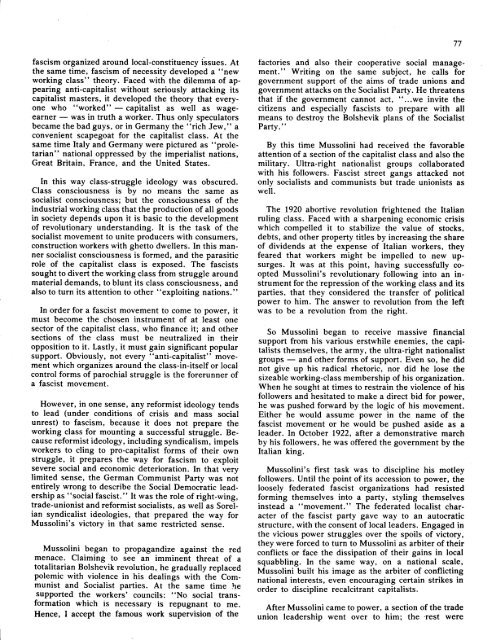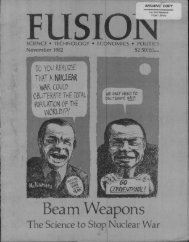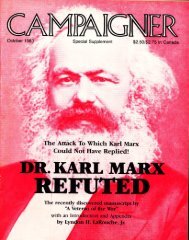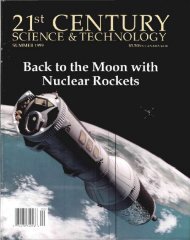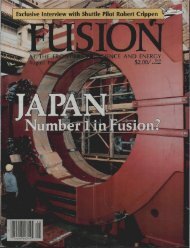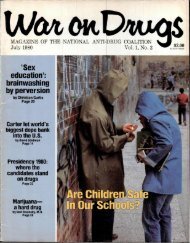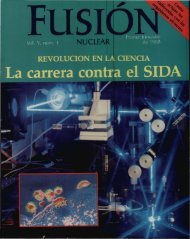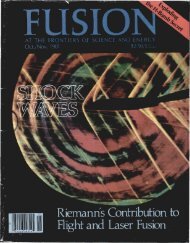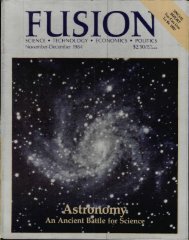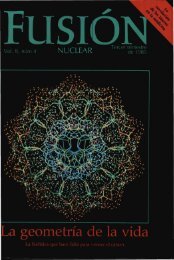New Left, Local Control, and Fascism
New Left, Local Control, and Fascism
New Left, Local Control, and Fascism
Create successful ePaper yourself
Turn your PDF publications into a flip-book with our unique Google optimized e-Paper software.
fascism organized around local-constituency issues. At factories <strong>and</strong> also their cooperative social managethe<br />
same time, fascism of necessity developed a "new ment." Writing on the same subject, he calls for<br />
working class" theory. Faced with the dilemma of ap- government support of the aims of trade unions <strong>and</strong><br />
pearing anti-capitalist without seriously attacking its government attacks on the Socialist Party. He threatens<br />
capitalist masters, it developed the theory that every- that if the government cannot act, "...we invite the<br />
one who "worked"--capitalist as well as wage- citizens <strong>and</strong> especially fascists to prepare with all<br />
earner -- was in truth a worker. Thus only speculators means to destroy the Bolshevik plans of the Socialist<br />
became the bad guys, or in Germany the "rich Jew," a Party."<br />
convenient scapegoat for the capitalist class. At the<br />
same time Italy <strong>and</strong> Germany were pictured as "prole- By this time Mussolini had received the favorable<br />
tarian" national oppressed by the imperialist nations, attention of a section of the capitalist class <strong>and</strong> also the<br />
Great Britain, France, <strong>and</strong> the United States. military. Ultra-right nationalist groups collaborated<br />
with his followers. Fascist street gangs attacked not<br />
In this way class-struggle ideology was obscured, only socialists <strong>and</strong> communists but trade unionists as<br />
Class consciousness is by no means the same as well.<br />
socialist consciousness; but the consciousness of the<br />
industrial working class that the production of all goods The 1920 abortive revolution frightened the Italian<br />
in society depends upon it is basic to the development ruling class. Faced with a sharpening economic crisis<br />
of revolutionary underst<strong>and</strong>ing. It is the task of the which compelled it to stabilize the value of stocks,<br />
socialist movement to unite producers with consumers, debts, <strong>and</strong> other property titles by increasing the share<br />
construction workers with ghetto dwellers. In this man- of dividends at the expense of Italian workers, they<br />
her socialist consciousness is formed, <strong>and</strong> the parasitic feared that workers might be impelled to new uprole<br />
of the capitalist class is exposed. The fascists surges. It was at this point, having successfully cosought<br />
to divert the working class from struggle around opted Mussolini's revolutionary following into an inmaterial<br />
dem<strong>and</strong>s, to blunt its class consciousness, <strong>and</strong> strument for the repression of the working class <strong>and</strong> its<br />
also to turn its attention to other "exploiting nations." parties, that they considered the transfer of political<br />
power to him. The answer to revolution from the left<br />
In order for a fascist movement to come to power, it was to be a revolution from the right.<br />
must become the chosen instrument of at least one<br />
sector of the capitalist class, who finance it; <strong>and</strong> other So Mussolini began to receive massive financial<br />
sections of the class must be neutralized in their support from his various erstwhile enemies, the capiopposition<br />
to it. Lastly, it must gain significant popular talists themselves, the army, the ultra-right nationalist<br />
support. Obviously, not every "anti-capitalist" movegroups<br />
-- <strong>and</strong> other forms of support. Even so, he did<br />
ment which organizes around the class-in-itself or local not give up his radical rhetoric, nor did he lose the<br />
control forms of parochial struggle is the forerunner of sizeable working-class membership of his organization.<br />
a fascist movement. When he sought at times to restrain the violence of his<br />
followers <strong>and</strong> hesitated to make a direct bid for power,<br />
However, in one sense, any reformist ideology tends he was pushed forward by the logic of his movement.<br />
to lead (under conditions of crisis <strong>and</strong> mass social Either he would assume power in the name of the<br />
unrest) to fascism, because it does not prepare the fascist movement or he would be pushed aside as a<br />
working class for mounting a successful struggle. Be- leader. In October 1922, after a demonstrative march<br />
cause reformist ideology, including syndicalism, impels by his followers, he was offered the government by the<br />
workers to cling to pro-capitalist forms of their own Italian king.<br />
struggle, it prepares the way for fascism to exploit<br />
severe social <strong>and</strong> economic deterioration. In that very Mussolini's first task was to discipline his motley<br />
limited sense, the German Communist Party was not followers. Until the point of its accession to power, the<br />
entirely wrong to describe the Social Democratic lead- loosely federated fascist organizations had resisted<br />
ership as "social fascist." It was the role of right-wing, forming themselves into a party, styling themselves<br />
trade-unionist <strong>and</strong> reformist socialists, as well as Sorel- instead a "movement." The federated localist charian<br />
syndicalist ideologies, that prepared the way for acter of the fascist party gave way to an autocratic<br />
Mussolini's victory in that same restricted sense, structure, with the consent of local leaders. Engaged in<br />
the vicious power struggles over the spoils of victory,<br />
they were forced to turn to Mussolini as arbiter of their<br />
Mussolini began to propag<strong>and</strong>ize against the red conflicts or face the dissipation of their gains in local<br />
menace. Claiming to see an imminent threat of a squabbling. In the same way, on a national scale,<br />
totalitarian Bolshevik revolution, he gradually replaced Mussolini built his image as the arbiter of conflicting<br />
polemic with violence in his dealings with the Com- national interests, even encouraging certain strikes in<br />
munist <strong>and</strong> Socialist parties. At the same time he order to discipline recalcitrant capitalists.<br />
supported the workers' councils: "No social transformation<br />
which is necessary is repugnant to me. After Mussolini came topower, a section of the trade<br />
Hence, I accept the famous work supervision of the union leadership went over to him; the .rest were<br />
77


